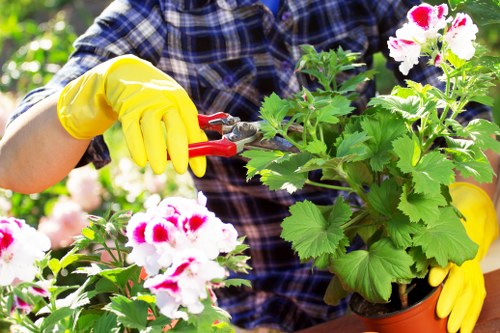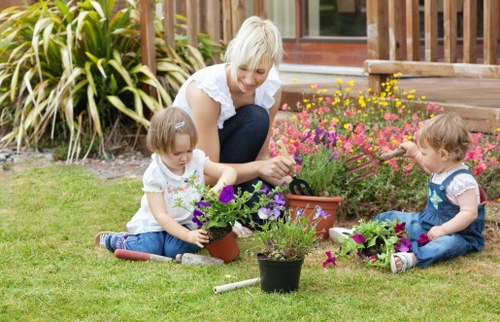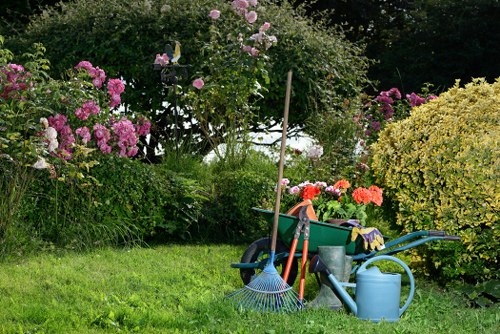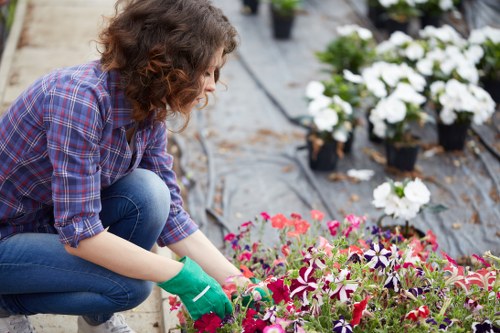Garden Maintenance in Landscape Gardening Gardeners
Maintaining a beautiful garden requires dedication, knowledge, and the right set of skills. Garden maintenance plays a crucial role in landscape gardening, ensuring that outdoor spaces remain vibrant, healthy, and visually appealing throughout the year. Whether you’re a seasoned gardener or just starting out, understanding the essentials of garden maintenance can transform your landscape into a stunning sanctuary.
In this comprehensive guide, we will explore various aspects of garden maintenance, providing you with practical tips and expert advice to keep your garden thriving. From soil health to pruning techniques, pest control to seasonal care, we’ve got you covered.

One of the foundational elements of garden maintenance is soil health. The right soil conditions promote robust plant growth, enhance nutrient absorption, and improve overall garden resilience.
Regular soil testing helps identify deficiencies and pH imbalances, allowing gardeners to amend the soil accordingly. Adding organic matter such as compost or well-rotted manure can significantly enhance soil fertility and structure.
Proper soil management not only supports plant health but also contributes to water retention and drainage, preventing issues like root rot and drought stress.
Key Elements of Garden Maintenance
Effective garden maintenance involves a combination of various tasks that work together to maintain plant health and aesthetic appeal. Here are the key elements every gardener should focus on:
- Soil Preparation and Health: Ensuring the soil is fertile and well-structured.
- Planting and Transplanting: Selecting appropriate plants and ensuring their optimal placement.
- Irrigation Management: Providing adequate and efficient watering practices.
- Pruning and Trimming: Maintaining plant shape and promoting growth.
- Weed Control: Keeping unwanted plants at bay to reduce competition.
- Pest and Disease Management: Protecting plants from harmful insects and pathogens.
- Seasonal Care: Adjusting maintenance practices according to seasonal changes.

Soil Preparation
Before planting, it’s essential to prepare the soil. This involves removing weeds, tilling the ground, and incorporating organic matter. Well-prepared soil provides a strong foundation for healthy plant growth.
Additionally, mulching can help retain moisture, suppress weeds, and regulate soil temperature. Choose a mulch that suits your garden’s needs, whether it’s organic like bark or inorganic like gravel.
Regularly amending the soil with compost or fertilizers ensures that plants receive the necessary nutrients for optimal growth.
Pruning and Trimming Techniques
Proper pruning is vital for maintaining plant health and enhancing the beauty of your garden. It helps in removing dead or diseased branches, promoting airflow, and encouraging new growth.
Regular pruning can prevent the spread of diseases and pests, ensuring your plants remain strong and vibrant. It also allows for better light penetration, which is crucial for photosynthesis and overall plant health.

Tools for Pruning
Having the right tools can make pruning easier and more effective. Essential pruning tools include:
- Pruning shears: For small branches and precise cuts.
- Pruning saw: For larger branches and thicker stems.
- Loppers: For medium-sized branches that require more power.
Ensure your tools are sharp and clean to make clean cuts and prevent the spread of diseases.
Weed Control Strategies
Weeds compete with your garden plants for nutrients, water, and sunlight, making effective weed control essential. Implementing a combination of manual and chemical methods can help keep your garden weed-free.
Mulching is an excellent preventive measure. By covering the soil with mulch, you create a barrier that inhibits weed seed germination. Additionally, regular weeding by hand or with tools ensures that weeds do not establish a strong presence.

Organic Weed Control
For eco-friendly weed management, consider using organic herbicides or natural weed killers. Vinegar-based solutions, boiling water, and manual removal are effective without harming the environment.
Integrating ground covers and dense planting can also reduce weed growth by outcompeting them for resources.
Consistent monitoring and early intervention are key to preventing weeds from taking over your garden.
Pest and Disease Management
Protecting your garden from pests and diseases is crucial for maintaining plant health. Early detection and prompt action can save your plants from severe damage.
Implement Integrated Pest Management (IPM) techniques, which combine biological, cultural, mechanical, and chemical methods to control pests sustainably. Encouraging beneficial insects like ladybugs and lacewings can naturally reduce pest populations.

Identifying Common Pests
Understanding the common pests that affect your garden helps in applying targeted solutions. Some common garden pests include:
- Aphids: Small insects that suck plant sap, causing stunted growth.
- Slugs and Snails: Mollusks that feed on leaves and stems.
- Spider Mites: Tiny arachnids that create webs and damage foliage.
Proper identification is the first step in effective pest control.
Seasonal Garden Care
Each season brings its unique challenges and opportunities for garden maintenance. Adapting your care routine to the changing seasons ensures your garden remains healthy and resilient.
Spring: Focus on planting new plants, pruning shrubs, and preparing beds for the growing season.
Summer: Maintain proper irrigation, control pests, and mulch to retain soil moisture.
Autumn: Clean up fallen leaves, plant bulbs for next spring, and prepare plants for winter.
Winter: Protect sensitive plants from frost, plan for the upcoming year, and perform tool maintenance.

Irrigation Management
Efficient irrigation is essential for garden health. Overwatering can lead to root rot and fungal diseases, while underwatering stresses plants. Implement a watering schedule that meets the specific needs of your plants.
Consider installing drip irrigation systems or soaker hoses to deliver water directly to the roots, reducing evaporation and water waste.
Mulching also plays a role in moisture retention, minimizing the frequency of watering needed during dry periods.
Fertilization Techniques
Providing the right nutrients is vital for plant growth and development. Fertilization replenishes the soil’s nutrient content, ensuring your plants receive the essential elements they need.
Choose fertilizers based on your soil test results and the specific requirements of your plants. Organic fertilizers, such as compost and manure, improve soil structure and provide a slow release of nutrients.

Types of Fertilizers
There are various types of fertilizers available, each with its benefits:
- Granular Fertilizers: Easy to apply and long-lasting.
- Liquid Fertilizers: Provide immediate nutrients and are ideal for quick fixes.
- Slow-Release Fertilizers: Gradually release nutrients over time, reducing the need for frequent applications.
Proper application according to the manufacturer’s instructions is crucial to avoid over-fertilization, which can harm plants and the environment.
Lawn Care and Maintenance
A well-maintained lawn enhances the overall appearance of your garden. Regular lawn care involves mowing, aerating, and fertilizing to keep the grass healthy and green.
Choose the right type of grass for your climate and soil conditions. Proper mowing techniques, such as not cutting more than one-third of the grass height at a time, promote strong root growth and prevent stress.

Dealing with Lawn Pests
Lawn pests like grubs, chinch bugs, and armyworms can damage your grass, leading to brown patches and thinning areas. Regular inspection and early detection are key to effective management.
Biological controls, such as introducing beneficial nematodes, can help reduce pest populations naturally. Chemical treatments should be used as a last resort and applied according to guidelines.
Maintaining healthy lawn practices, like proper watering and fertilization, can make your grass more resilient to pest attacks.
Incorporating Sustainable Practices
Adopting sustainable garden maintenance practices not only benefits the environment but also promotes long-term garden health. Here are some eco-friendly strategies:
- Composting: Recycling kitchen and garden waste into nutrient-rich compost.
- Rainwater Harvesting: Collecting and using rainwater for irrigation.
- Native Planting: Choosing plants native to your region that require less water and maintenance.
- Organic Pest Control: Using natural predators and organic solutions to manage pests.

Benefits of Sustainable Gardening
Sustainable gardening reduces the reliance on chemical fertilizers and pesticides, promoting a healthier ecosystem. It also conserves water, reduces waste, and supports biodiversity by providing habitats for beneficial insects and wildlife.
Implementing sustainable practices can lead to a more resilient and self-sustaining garden, less dependent on external inputs.
Moreover, it aligns your gardening efforts with environmental conservation, contributing to a healthier planet.
Choosing the Right Garden Maintenance Services
If maintaining your garden feels overwhelming, professional garden maintenance services can be a great solution. Experienced landscapers and gardeners offer expertise and a range of services tailored to your garden’s needs.
From regular mowing and pruning to specialized services like soil analysis and pest management, hiring professionals ensures your garden receives comprehensive care.

What to Look for in a Garden Maintenance Service
When selecting a garden maintenance service, consider the following factors:
- Experience and Expertise: Choose a service with a proven track record and knowledgeable staff.
- Comprehensive Services: Ensure they offer a range of services that match your garden’s requirements.
- Customer Reviews: Check testimonials and reviews to gauge customer satisfaction.
Communicate your specific needs and preferences clearly to ensure the service aligns with your vision for your garden.
Final Thoughts on Garden Maintenance
Effective garden maintenance is the cornerstone of successful landscape gardening. By paying attention to soil health, proper pruning, weed control, pest management, and seasonal care, you can create a flourishing garden that brings joy and tranquility.
Whether you choose to maintain your garden yourself or enlist the help of professionals, investing time and effort into garden maintenance pays off with a beautiful and resilient outdoor space.
Ready to transform your garden? Contact us today and let our expert gardeners help you achieve the garden of your dreams.



